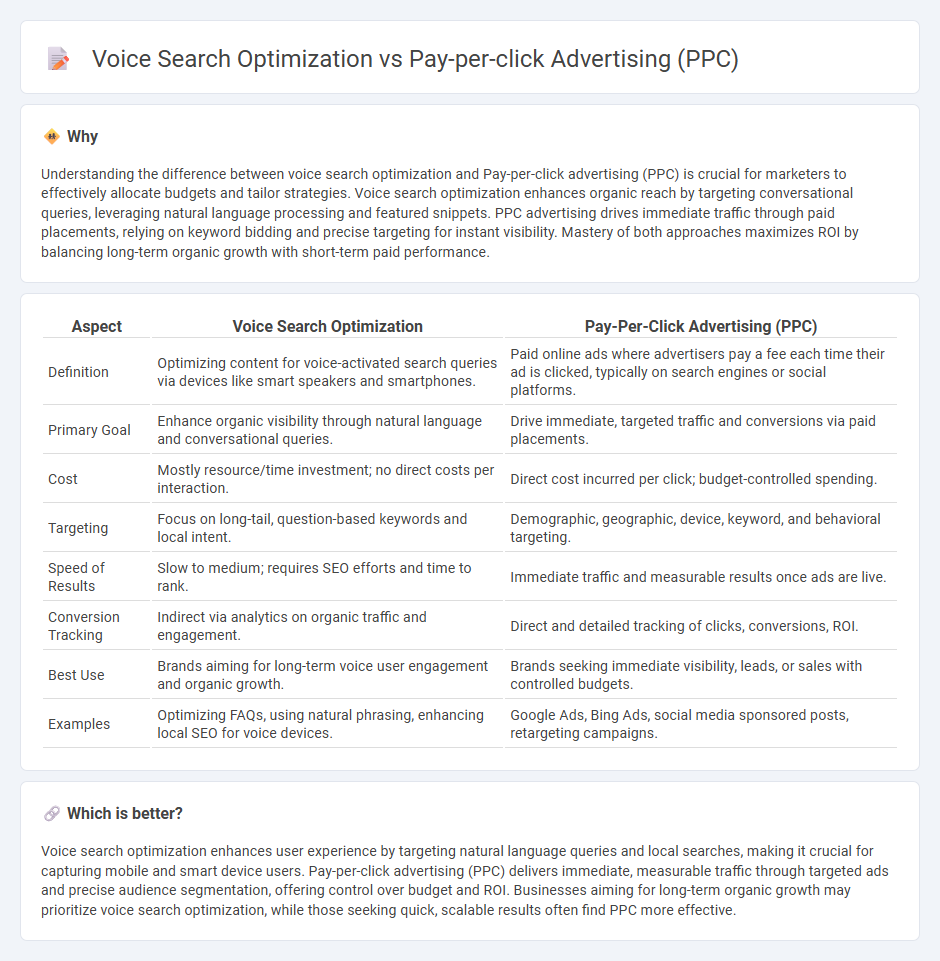
Voice search optimization enhances user engagement by tailoring content to natural language queries, boosting organic traffic through conversational keywords and improved local search visibility. Pay-per-click advertising (PPC) drives instant website traffic by bidding on targeted keywords, providing measurable ROI and precise audience targeting across platforms like Google Ads and Bing Ads. Explore the distinct advantages of voice search optimization and PPC advertising to elevate your marketing strategy effectively.
Why it is important
Understanding the difference between voice search optimization and Pay-per-click advertising (PPC) is crucial for marketers to effectively allocate budgets and tailor strategies. Voice search optimization enhances organic reach by targeting conversational queries, leveraging natural language processing and featured snippets. PPC advertising drives immediate traffic through paid placements, relying on keyword bidding and precise targeting for instant visibility. Mastery of both approaches maximizes ROI by balancing long-term organic growth with short-term paid performance.
Comparison Table
| Aspect | Voice Search Optimization | Pay-Per-Click Advertising (PPC) |
|---|---|---|
| Definition | Optimizing content for voice-activated search queries via devices like smart speakers and smartphones. | Paid online ads where advertisers pay a fee each time their ad is clicked, typically on search engines or social platforms. |
| Primary Goal | Enhance organic visibility through natural language and conversational queries. | Drive immediate, targeted traffic and conversions via paid placements. |
| Cost | Mostly resource/time investment; no direct costs per interaction. | Direct cost incurred per click; budget-controlled spending. |
| Targeting | Focus on long-tail, question-based keywords and local intent. | Demographic, geographic, device, keyword, and behavioral targeting. |
| Speed of Results | Slow to medium; requires SEO efforts and time to rank. | Immediate traffic and measurable results once ads are live. |
| Conversion Tracking | Indirect via analytics on organic traffic and engagement. | Direct and detailed tracking of clicks, conversions, ROI. |
| Best Use | Brands aiming for long-term voice user engagement and organic growth. | Brands seeking immediate visibility, leads, or sales with controlled budgets. |
| Examples | Optimizing FAQs, using natural phrasing, enhancing local SEO for voice devices. | Google Ads, Bing Ads, social media sponsored posts, retargeting campaigns. |
Which is better?
Voice search optimization enhances user experience by targeting natural language queries and local searches, making it crucial for capturing mobile and smart device users. Pay-per-click advertising (PPC) delivers immediate, measurable traffic through targeted ads and precise audience segmentation, offering control over budget and ROI. Businesses aiming for long-term organic growth may prioritize voice search optimization, while those seeking quick, scalable results often find PPC more effective.
Connection
Voice search optimization and pay-per-click advertising (PPC) intersect through their focus on intent-based targeting to enhance digital marketing effectiveness. PPC campaigns leverage voice search keyword data to capture high-intent queries, improving ad relevance and click-through rates. Optimizing content for voice search allows advertisers to align PPC strategies with natural language patterns, driving better customer engagement and conversion rates.
Key Terms
Click-Through Rate (CTR)
Pay-per-click advertising (PPC) generates instant traffic by targeting specific keywords, often resulting in higher Click-Through Rates (CTR) due to prominent ad placement on search engine results pages. Voice search optimization enhances CTR by aligning content with natural language queries, capturing voice-activated user intent and increasing engagement from smart device users. Explore detailed strategies to maximize CTR through both PPC and voice search optimization for comprehensive digital marketing success.
Keyword Targeting
Pay-per-click advertising (PPC) relies heavily on precise keyword targeting to drive immediate traffic through paid search results, focusing on short-tail and exact match keywords for high conversion rates. Voice search optimization prioritizes natural language, conversational phrases, and long-tail keywords to match how users verbally phrase queries, enhancing relevance in voice assistant results. Explore advanced strategies to master keyword targeting for both PPC and voice search to maximize your digital marketing impact.
Conversational Queries
Pay-per-click advertising (PPC) targets specific keywords to drive immediate traffic, while voice search optimization emphasizes natural language and conversational queries to align with how users speak. Conversational queries often feature longer, question-based phrases that require content to be optimized for semantic relevancy and local intent. Discover how integrating PPC and voice search strategies can maximize your digital marketing effectiveness.
Source and External Links
Pay-Per-Click (PPC) - Definition, Basics, How it Works - PPC is an online advertising model where advertisers pay publishers each time their ad is clicked, mainly using keywords to reach targeted audiences on platforms like Google Ads and Facebook Ads, making it cost-effective as payment is linked to actual user engagement.
What is PPC? Complete Guide to Pay-Per-Click Marketing - Shopify - PPC marketing is a digital advertising model where advertisers pay only when users click on their ads, widely used on platforms such as Google Ads and Meta Ads, enabling precise targeting without paying for unclicked impressions.
Pay per Click Ad (PPC) Definition - Popupsmart Community - PPC advertising requires choosing targets, setting bids and budgets, and winning auctions for ad placement, with payment only for actual clicks, offering measurable performance and fast, highly targeted, and cost-effective campaigns.
 dowidth.com
dowidth.com